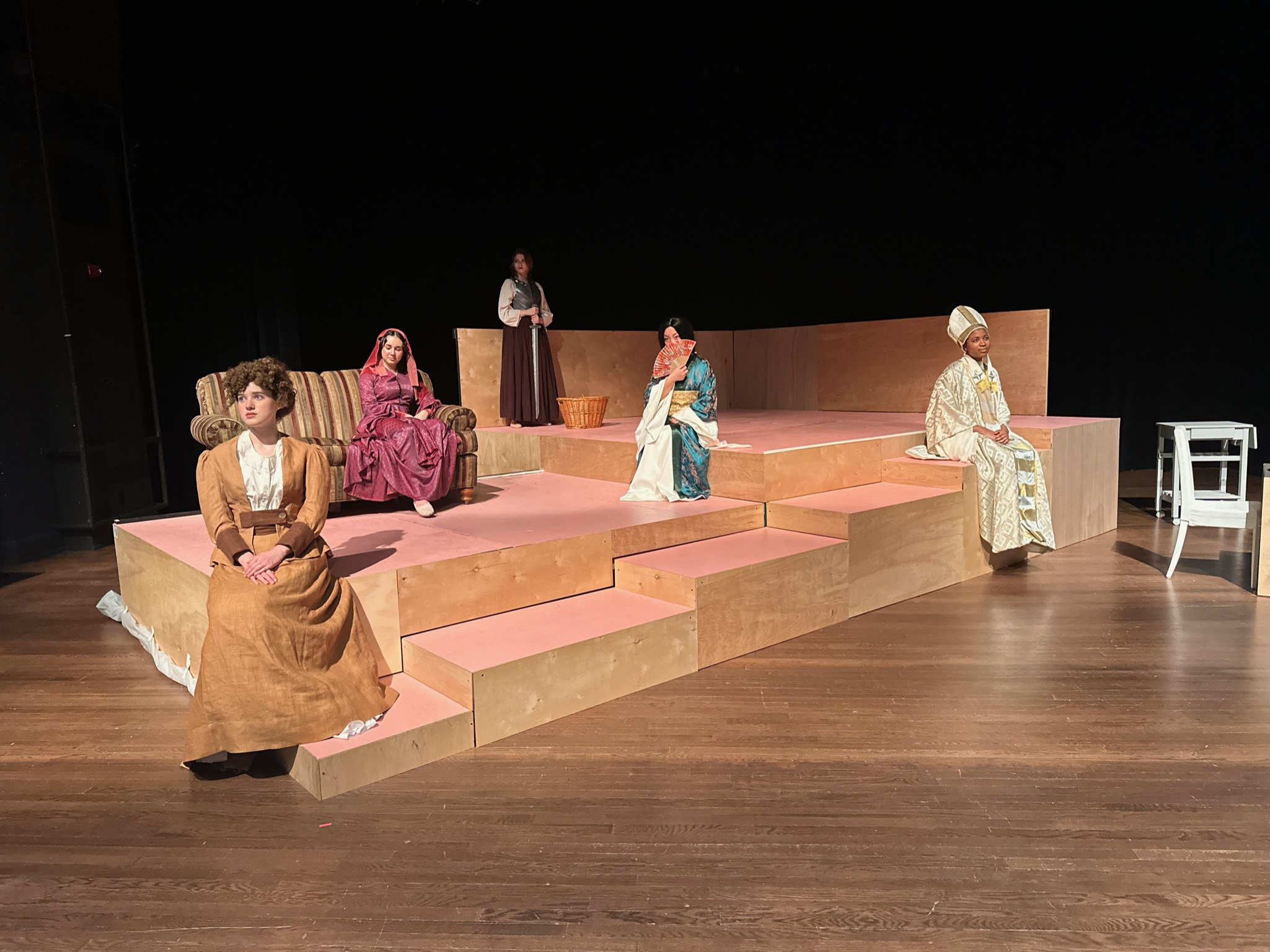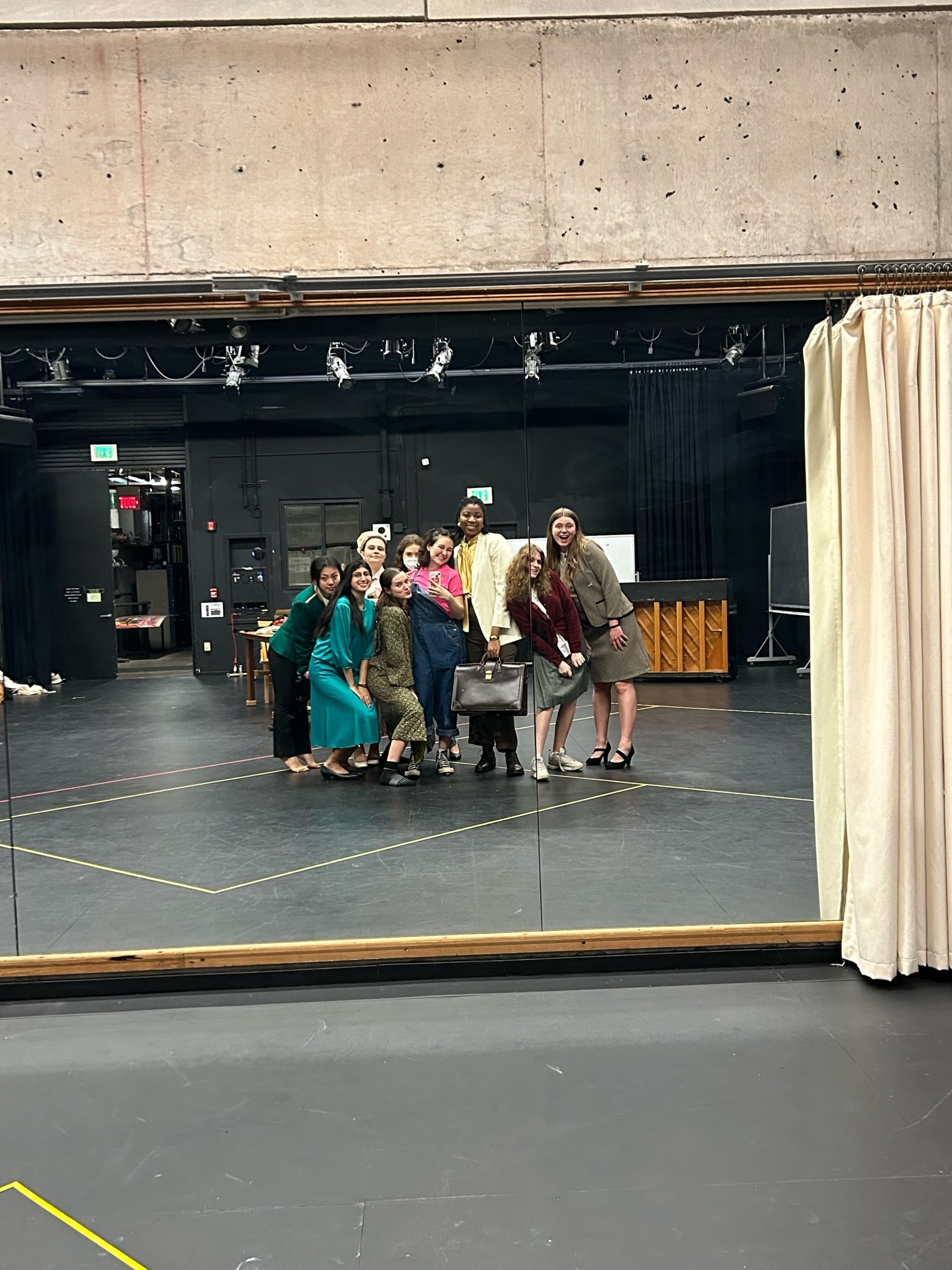
“Top Girls,” a senior thesis directed by Annabella Machnizh ’23, opened in the Patricelli ’92 Theater on Thursday, March 2 at 7 p.m. and will be performed on Friday, March 3 at 7 p.m. and Saturday, March 4 at 5 p.m. Based in London in the 1980s, the show revolves around the main character, Marlene, who has just been promoted to managing director at the Top Girls Employment Agency, where she works. Through surreal dream sequences and intense flashbacks, the show asks questions about what it takes to get to the top and what Marlene is willing to sacrifice to get where she wants to be. At its core, “Top Girls” allows the audience to reflect on what it means for women to talk to one another and how the patriarchy has seeped into these conversations.
“I want the audience to love and hate these women,” Machnizh said. “I want the audience to feel compelled to listen to them and their stories.”
At first, I was more skeptical than “compelled.” Why are all these women, dressed in varying periodical garb, gathered around a nondescript dining table? Why are they all interrupting each other? Can’t they just shut up and listen to one another? What could they possibly have in common? Why am I both annoyed by and enamored with these women? These kinds of questions didn’t stop pestering me for the entirety of the show. I became enraptured and was eventually left with a single question: Why does womanhood seem to necessitate pain? This is a question that I had been hiding from alongside with the 18 female characters of the play. Though female pain is yet to be resolved in our society, it is wonderfully portrayed and explored in this play.
Top Girls examines womanhood in two ways. Although the play is technically set in Marlene’s (Lila Popell ’24) 1980s dining room, the first act includes women from a range of time periods, gathered together in an otherworldly defiance of time to share their struggles against male oppression and violence towards women. It might be assumed that this represents Marlene’s internal battle with feeling empowered as a woman. This production perfectly executes the unsettling nature of a women’s dinner party in which repressed female pain is molded into dinner conversation.
As the characters recount traumatic events amid exceedingly troubling laughter and the constant pouring of wine, the audience becomes lost trying to dissect these women’s sorrows from their peace. They watch characters who have been forced to cope with both emotional and physical pain all their lives, to only bring it up casually at a dinner party. It exposes any wine-drunk conversation between women to be much deeper than it might seem.
There is one especially striking moment in which Pope Joan (Alisha Simmons ’24), in a state of shock, retells her childbirth experience—fatal for both her and her child—while the other women shriek and laugh. As the story grows violent, so does the laughter, displaying the terrifying forced removal of these women from the dire reality of their situations. It has become impossible for these women to face pain, so they turn from it and laugh.
Conversely, the other side of womanhood displayed in the second and third acts takes place at two different points in time (just after Marlene has gotten her promotion and one year before) and features a group of Marlene’s friends and family, all women with varying circumstances and obstacles. We are transported to the Britain of 1981, where we are introduced to the struggles of the modern woman. Specifically, the play centers the dilemma between being successful in business, as represented by professional Marlene, or committing to a family by being a good mother and daughter, as represented by Marlene’s sister Joyce (Kiera Moran ’24, who also plays the adventurer Isabella Bird in the first act).
This tension may seem simplistic or far too distinctive to the ’80s to matter to the modern feminists of 2023. But the final act, a standoff between Marlene and Joyce, displays this issue to be much more rooted in society and the general female plight than we might assume. This play hands us no answers, and it certainly does not pretend that there is a right way to be a woman.
“Top Girls” portrays female oppression in broad, emotive strokes, and it doesn’t shy away from the political, considering this is where feminism often manifests.
“The play is very heavily focused on second-wave British feminism, which is very centered around Margaret Thatcher and this division of socialist feminism,” Machnizh said. “Individualist feminism, which is [when] one woman [is] in power, is already a step up for all women even if [the woman in power] isn’t doing much to help anyone.”
These issues were especially prominent in 1981. Margaret Thatcher, Britain’s first female prime minister, was elected in 1979 and served until 1990, becoming the longest-serving prime minister in the 20th century and setting a new precedent for women in leadership roles. Yet she wasn’t exactly a feminist icon. In the 11 years of her term as prime minister, she did not promote a single woman to her cabinet. She also famously called herself the “only man” in her cabinet, glorifying conventionally masculine traits, and creating the sense for career-driven women at the time that they had to behave like men in order to get anywhere.
“Just because a woman has power doesn’t mean it should be the end-all-be-all,” Machnizh said. “If women are still trying to gain power in a society that’s broken and designed to pin them against each other, then what’s the point of having that power at all?”
This idea appears in Marlene’s character, who seems to sacrifice all emotional and maternal aspects of herself in order to succeed in her career. Still, the play portrays how societal opinions make it difficult for women to simply have a career. “You’re not natural,” one character screams at Marlene, which summarizes the public opinion of many, fostered by the capitalist ideology of the nuclear family. Women have been believed to be part of nature, swayed by cycles and conceptions, naturally upholding the domestic, separate from the modern, advanced world.

The dilemma deepens as Thatcher, a neoliberal whose administration leans into capitalist-driven values so that the economy and society can reorder and stabilize, even at the detriment of those exploited by capitalism, particularly women and workers. At one point, the tension between Marlene and Joyce regarding their respective lifestyle choices explodes into the political argument lurking beneath.
“I hate the working class,” Marlene states, proclaiming her support for Thatcher and U.S. President Ronald Reagan. “I spit when I see a Rolls Royce,” Joyce says. This displays how entangled social politics, specifically paternalistic capitalism and the female struggle for power, really is.
In the second act, the juxtaposition between high schooler Angie’s (Casey Epstein-Gross ’25) wild girlishness, Marlene’s sterile professionalism, and Joyce’s downtrodden cynicism foreshadows Angie’s inevitable doom. Angie just wants to live without feeling so judged all the time, though she can’t help but always do the wrong thing. This makes Joyce’s final comment—“She won’t make it”—and cold stare in the second act, in front of the two other women Marlene works with at the agency, Win (Rose Chen ’26) and Nell (Simmons), all the more harrowing. If women do not do things exactly the right way, either exactly “like a man” or exactly “like a woman,” they won’t make it. Not only do women have very few options, but they must behave perfectly. This is not possible for everyone, as shown when we sense the big, bad world looming above Angie, ready to eat her alive. She won’t be able to do anything to stop it.
As was probably obvious from my highly emotional and metaphysical response to the play itself, the execution from the all-female and -non-binary team bringing this play to life was not only well done, but incredibly intricate. Every choice was pointed and carried weight. Maybe there is something to be said for the feminine perfectionism this world forces on us.
This play’s structure revolves around conversation, and scenes are largely conversations without much movement. Thus, it relies on the actors’ complete immersion in the discussion, as well as choices specific to their character, as the control of the audience hangs entirely on their performance. Every actor was committed to their character without fear. There are two young teens, Kit (Kiara Reeves ’26) and Angie, in this performance, whose mindsets and actions have an explicitly childish quality. This is very difficult for an adult to do naturally, yet I did not question the accuracy of their impressions once. The characters were exaggerated enough that the comedy and ignorance of a child’s mind came through, but never slipped into overacting.
Another impressive feat was from Moran, who was required to have a British accent in the first act and an American accent in the second. As a British American who grew up in Britain, Moran rendered both accents flawlessly. Popell, playing Marlene, should also be praised for her effortless embodiment of a complex character, especially considering that she was an understudy for the role up until only two weeks before the show debuted. She commanded the audience with such confidence that this fact was impossible to tell, and I’m sure any viewer would be glad she claimed a well-deserved spotlight. Each cast member shone, and I couldn’t find one weak link. Generally, the actors did a fantastic job immersing me in the characters and the questions each one posed.
Though a two-hour show can be intimidating, Machnizh urged the audience not to worry. Not only will the time fly by, but you’ll feel like you’ve gained a lifetime of insight and self-reflection. Though the show is sold out, if you show up to the performance, you may have the chance to get an unclaimed ticket. Check out the show’s Instagram, @topgirlswes, for more information.
Charlotte Seal can be reached at cseal@wesleyan.edu.


Leave a Reply